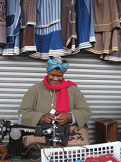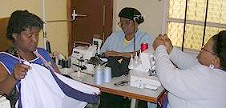Walter Sisulu University (South Africa)

Walter Sisulu University was founded in 2005 following the merger of three universities in the Eastern Cape. Strategically located within the Eastern Cape, WSU straddles a vast spectrum of the urban and rural divide of the region. One of the institution’s goals is to foster community and university engagement in order to strengthen the government’s ability to aid the Eastern Cape province. WSU’s website>>
Sustainable Skills Development Project
This project focuses on sustainable community, economic and institutional development in a holistic way through working with local partners in South Africa. It seeks to support poverty reduction and increases access to incomes and employment through skills development, thereby enhancing WSU’s community outreach mandate.
African Rondavel Cooperative
 The African Rondavel Cooperative is an artist-driven economic and community development that is focusing on the rural and poor areas within Eastern Cape South Africa. The foundation of the ARC is based on using varying degrees of culture as an impetus for job creation within impoverished areas by creating and working with existing sewing and craft cooperatives while engaging designers and other visual artist in the process. The Walter Sisulu University Fashion Department is as a primary partner in this initiative to assist in training, development and creating an outlet for its fashion students to participate in the social development of their country while applying their acquired knowledge.
The African Rondavel Cooperative is an artist-driven economic and community development that is focusing on the rural and poor areas within Eastern Cape South Africa. The foundation of the ARC is based on using varying degrees of culture as an impetus for job creation within impoverished areas by creating and working with existing sewing and craft cooperatives while engaging designers and other visual artist in the process. The Walter Sisulu University Fashion Department is as a primary partner in this initiative to assist in training, development and creating an outlet for its fashion students to participate in the social development of their country while applying their acquired knowledge.
Street Law
 Third-year LL.B students have the opportunity to participate in the Street Law Service Learning Programme, which aims to inform rural community members about their human rights. Students receive training before facilitating workshops in the rural areas. Among the subjects addressed are HIV/AIDS and the law, domestic violence, democracy, citizen participation, and xenophobia. Students are evaluated on their presentations and they help evaluate the workshops. They also volunteer in Walter Sisulu University’s law clinic, where community members can seek additional assistance.
Third-year LL.B students have the opportunity to participate in the Street Law Service Learning Programme, which aims to inform rural community members about their human rights. Students receive training before facilitating workshops in the rural areas. Among the subjects addressed are HIV/AIDS and the law, domestic violence, democracy, citizen participation, and xenophobia. Students are evaluated on their presentations and they help evaluate the workshops. They also volunteer in Walter Sisulu University’s law clinic, where community members can seek additional assistance.
Population Medicine
Established in 2001, WSU’s Population Medicine program seeks to train doctors to be able to work in the rural areas. The main purpose of the program is to integrate teaching, research and service at community level and to change the traditional teaching system and the students’ necessity to work on real-life problems. WSU students with faculty tutors make weekly visits to rural clinics and communities.
Technical and Business Education Initiative in South Africa (TABEISA)
The overall aim of the TABEISA is to generate increased employment for people from disadvantaged communities and to foster small business creation. WSU works with other universities to develop strategies to ensure that higher education is fully accessible to previously disadvantaged South Africans.
Child and Adolescent Development Service Learning Module
The Child and Adolescent Development SL Module, one of several service learning courses at Walter Sisulu University, is offered to third-year Psychology students as an opportunity to do hands-on counseling work. University students visit orphanages, hospitals, and schools to offer their services to children who have suffered emotional trauma. Because they are often close in age, the children relate to the university students. The service learning module allows students to gain practical experience while offering counseling to children who would normally not have access to those services.